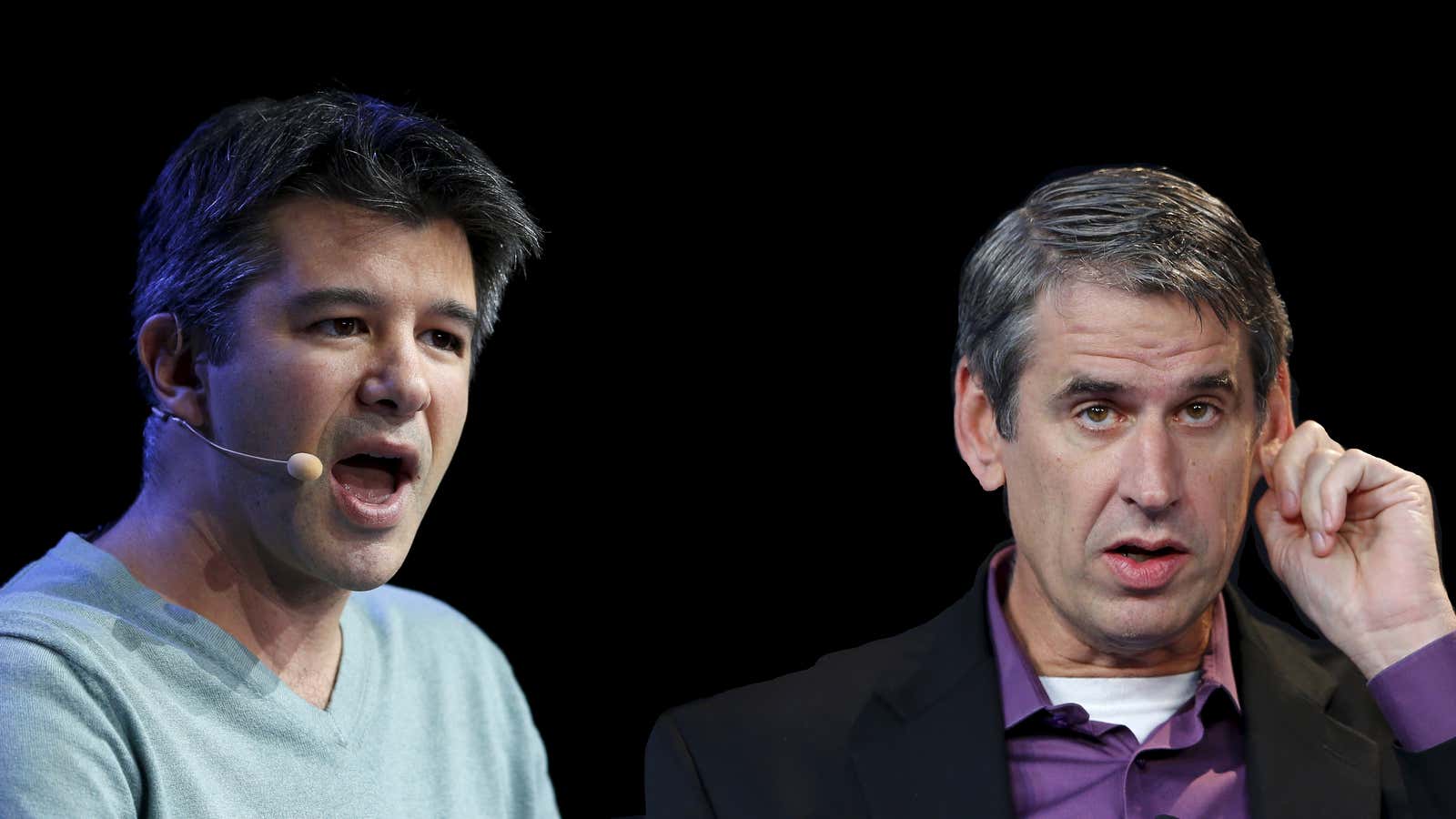Remember the good old days when Uber and its investors all got along? YouTube does. Here is a 2013 video in which Benchmark Capital’s investment guru Bill Gurley positively gushes about Uber co-founder and then-CEO Travis Kalanick:
He got so many things right. PR. He’s been extremely effective at the regulatory world… there’s no reason to expect anybody in Silicon Valley to be good at that. And he’s just used social media in such a way that it’s probably like no one’s ever done it before. So I’ve just been really impressed and continue to be impressed. In addition to what everyone sees externally, he’s remarkably focused on operating controls, continuous improvement internally. The playbooks that we have for launching new cities are just amazing, and the metrics all get better… He’s also remarkably audacious and ambitious and wants to do big great things.
And later:
Look, one thing about Travis I’ll tell you that for me is just super exciting is that he loves business. He loves products too but he loves business. And I think we’ve had a few high-profile entrepreneurs who love product but could probably take it without business if they didn’t have to. And I think they’re not going to get as far as a result. Because look, business strategy is an art. And there’s competition, and you have to go out and win, and you have to think about offense and defense and moats and all these types of things. And he’s great at it. I wouldn’t want to bet against him. I’m glad I’m not.
What would 2013 Bill Gurley say to 2017 Bill Gurley, who is now very much betting against Travis Kalanick? On Aug. 10 Benchmark sued Kalanick and Uber in Delaware Chancery Court, alleging that he concealed “gross mismanagement and other misconduct” while procuring three additional seats on the board in 2016 to consolidate control of the company. The complaint runs through the greatest hits of Uber’s 2017 scandals: its ongoing litigation with self-driving carmaker Waymo; its mishandling of a rape incident in India; its “pervasive culture of sexism, discrimination, and harassment;” and its “Greyball” program designed to deceive regulatory authorities worldwide.
“Kalanick fraudulently obtained control of three newly created seats on Uber’s Board by his material misstatements and fraudulent concealment from Benchmark of material information that would have led Benchmark to reject the creation of the seats,” the complaint alleges.
Oh but would it have? It’s not as though Uber were so straight-laced in 2013 or the Kalanick regulatory playbook that Gurley once admired so clean. Consider this 2012 article about all the legal trouble Uber was in at the time, including a ban in New York City, lawsuits in San Francisco and Chicago, a cease-and-desist letter from the Massachusetts Division of Standards, and a $20,000 fine from California’s Public Utilities Commission. Or the accompanying quote from Kalanick: “If you put yourself in the position to ask for something that is already legal, you’ll find you’ll never be able to roll out.”
Uber has never bothered with asking permission or even begging forgiveness—it simply does what it wants. That was just fine with investors when Uber was growing faster than they’d ever thought possible and pairing fiery regulatory skirmishes with PR-friendly deliveries of kittens and ice cream. It is apparently less OK with them now that the company is the poster child for startup scandal and losing ground to competitors like Lyft. The same things about Kalanick that made Uber great also turned him into a liability.
Benchmark is just one player in this drama. A day after the venture-capital firm filed its lawsuit, another group of Uber investors, led by Sherpa Capital co-founder and Kalanick party buddy Shervin Pishevar, petitioned to have Benchmark sell enough of its shares to step down from Uber’s board (Pishevar’s group is offering to buy those shares). And then Benchmark followed that up with an open letter to Uber employees saying the firm only regrets not taking action against Kalanick sooner.
Benchmark, of course, remains confident that Uber “could comfortably be worth over $100B in just two years.” Now about that CEO search…
